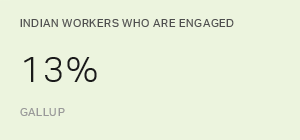Story Highlights
- Two-thirds of Chinese are satisfied with their 2014 household income
- Nearly half of the poorest Chinese are even satisfied with income
- Satisfaction with savings jumps to 44% in 2014, from 25% in 2009
WASHINGTON, D.C. -- The worldwide economic crisis in 2009 hammered China's economy, but the nation rebounded far more quickly than many of its global counterparts. Even as their economic growth has slowed recently, that bounce is reflected in Chinese satisfaction with their household income levels. Two-thirds of Chinese (66%) in 2014 were very or somewhat satisfied with their household income, up from less than half (46%) in 2009.
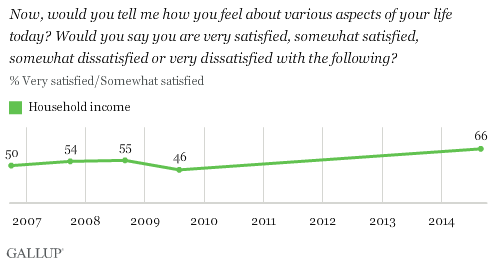
Not surprisingly, Chinese satisfaction with their household income increases steadily as their income level increases. Still, with the exception of the poorest 20% of the population -- of which nearly half are satisfied -- majorities of Chinese in each income quintile are satisfied with the amount of money their household brings in. This is a remarkable achievement for a nation that just embraced private enterprise and opened its markets to international trade in 1978.
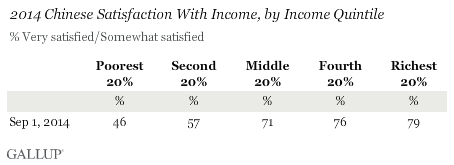
Satisfaction With Savings Earns Interest
As Chinese satisfaction with their household income has soared, so has satisfaction with the amount of savings they have been able to set aside for future needs, such as housing, education, healthcare and retirement. One in four Chinese (25%) were satisfied with their savings amid the financial slump in 2009, but by 2014, that figure had climbed to 44%. Despite Chinese policymakers' efforts to boost consumer spending, the country's aging population continues to place a high priority on saving for the future even as their household income increases.
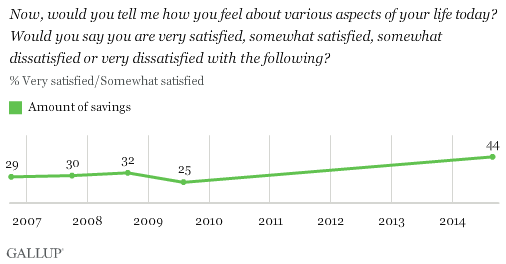
Satisfaction Up in Other Areas Too
Chinese are also more content with other aspects of their lives than they were during the global recession in 2009. In 2014, the majority of Chinese expressed satisfaction with family life (85%, up from 76% in 2009), their current housing (70%, up from 57%), the education they had received (55%, up from 43%), and the education their children were receiving (48%, up from 36% in 2009).
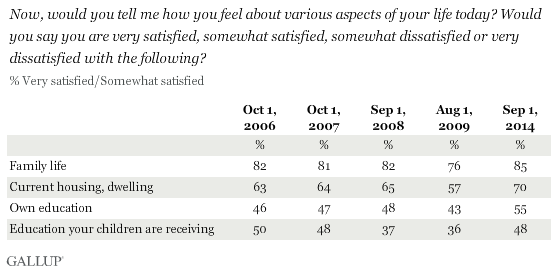
Bottom Line
China's current economic slowdown could substantially affect Chinese satisfaction with their income and savings -- particularly among those in the lower-income brackets. Though satisfaction with household income may decrease for this group, Chinese are more likely to put the brakes on consumer spending rather than curtail their coveted savings plans, directly opposing the government's wish for Chinese to spend more on consumer goods and services. It will be instructive to monitor how the current economic slowdown in the country -- with plunging stocks and a devalued currency -- affects the level of satisfaction Chinese have with their household income and savings for 2015.
Survey Methods
Results are based on interviews with 4,696 adults, aged 15 and older, including a national sample conducted face to face in China and an oversample conducted by landline telephone in Shanghai, Beijing and Guangzhou in September 2014. For results based on the total sample of national adults, the margin of sampling error is 卤2.2 percentage points at the 95% confidence level. All reported margins of sampling error include computed design effects for weighting.
For more complete methodology and specific survey dates, please review .
Learn more about how the works.
